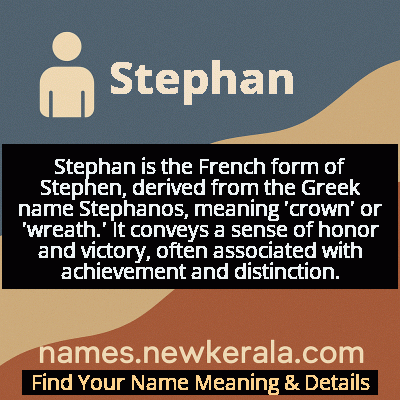Stephan Name Meaning & Details
Origin, Popularity, Numerology Analysis & Name Meaning of Stephan
Discover the origin, meaning, and cultural significance of the name STEPHAN. Delve into its historical roots and explore the lasting impact it has had on communities and traditions.
Name
Stephan
Gender
Male
Origin
French
Lucky Number
2
Meaning of the Name - Stephan
Stephan is the French form of Stephen, derived from the Greek name Stephanos, meaning 'crown' or 'wreath.' It conveys a sense of honor and victory, often associated with achievement and distinction.
Stephan - Complete Numerology Analysis
Your Numerology Number
Based on Pythagorean Numerology System
Ruling Planet
Moon
Positive Nature
Diplomatic, friendly, artistic, empathetic.
Negative Traits
Over-sensitive, moody, indecisive, prone to self-pity.
Lucky Colours
Green, cream, white.
Lucky Days
Monday.
Lucky Stones
Pearl, moonstone.
Harmony Numbers
1, 3, 4.
Best Suited Professions
Diplomats, mediators, caregivers, artists.
What People Like About You
Cooperative spirit, friendliness, artistic talent.
Famous People Named Stephan
Stephan Schneider
Fashion Designer
Founded influential minimalist fashion label in 1996
Stephan El Shaarawy
Professional Footballer
Internationally recognized forward for AS Roma and Italian national team
Stephan James
Actor
Award-winning Canadian actor known for critically acclaimed performances
Stephan Bonnar
Mixed Martial Artist
UFC Hall of Famer who helped popularize mixed martial arts globally
Name Variations & International Equivalents
Click on blue names to explore their detailed meanings. Gray names with will be available soon.
Cultural & Historical Significance
Extended Personality Analysis
Psychological studies and cultural observations suggest that individuals named Stephan often develop personality traits that reflect their name's regal meaning and historical significance. Typically, Stephans demonstrate a natural authority that stems from competence rather than arrogance, earning respect through their reliable nature and thoughtful decision-making. They tend to be strategic thinkers who excel at seeing the bigger picture while managing details effectively. Many exhibit a diplomatic nature that allows them to navigate complex social situations with grace and tact. The name's European origins often correlate with cultural sophistication and appreciation for arts, literature, and intellectual pursuits. Stephans frequently display strong ethical compasses and may be particularly attuned to issues of justice and fairness. Their leadership style tends to be inclusive and mentoring rather than authoritarian, making them effective team builders and collaborators. While they can be reserved in unfamiliar settings, those who know them well often describe Stephans as loyal friends with sharp wit and deep emotional intelligence. This combination of intellectual depth, moral strength, and interpersonal skill creates a personality profile that balances traditional virtues with contemporary adaptability.
Modern Usage & Popularity
In the 21st century, Stephan continues to maintain its position as a distinguished and internationally recognizable name, though its usage patterns have evolved significantly. Current demographic data shows that while the name has declined from its peak popularity in the late 20th century, it has stabilized as a sophisticated choice that avoids being trendy or overused. In French-speaking countries, Stephan ranks as a solid classic outside the top 50 names, appealing to parents seeking a name with cultural depth without being overly common. The name enjoys stronger popularity in German-speaking regions, where it maintains consistent presence in naming charts. Interestingly, Stephan has seen renewed interest among multicultural families who appreciate its easy pronunciation across languages and its elegant European flair. Modern name analytics indicate that Stephans born in recent decades often come from educated, internationally-minded families who value both tradition and global connectivity. The name's professional advantages remain notable—studies suggest that 'Stephan' conveys reliability and intelligence in business contexts. Current naming trends position Stephan as an ideal choice for parents seeking a name that bridges historical significance with contemporary sophistication, offering both distinctive character and timeless appeal.
Symbolic & Spiritual Meanings
The symbolic resonance of Stephan encompasses multiple layers of meaning that have accumulated over centuries of cultural use. At its core, the 'crown' symbolism represents not just royalty but earned achievement—the victor's wreath in ancient games, the scholar's laurel, the martyr's crown of eternal life. This creates a powerful metaphor for success achieved through merit, discipline, and moral integrity. In psychological symbolism, the name suggests someone who carries an invisible crown—not of birthright, but of character and accomplishment. The circular nature of wreaths and crowns also symbolizes completeness, eternity, and the cyclical nature of leadership and responsibility. In literary and artistic contexts, Stephan often represents the archetype of the enlightened leader or the principled intellectual. The name's Christian heritage adds layers of spiritual symbolism, connecting to concepts of sacrifice, faith, and ultimate victory over adversity. Modern symbolic interpretations extend to representing bridge-building between traditions and innovation, between different cultures and perspectives. This rich symbolic landscape makes Stephan a name that communicates depth, purpose, and the idea that true greatness comes not from what one is given, but from what one builds and earns through life's journey.

